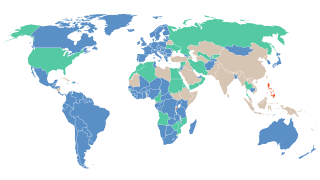28 articles:

Antigua and Barbuda and the ICC: Antigua and Barbuda signed the Rome Statute on 23 October 1998 and deposited its instrument of ratification of the Rome Statute on 18 June 2001.

As a member of the Organization of American States, Argentina has supported the promotion of the International Criminal Court by adopting an annual resolution by the General Assembly of the OAS and by holding an annual working meeting of high-level within the Political and Juridical Affairs Committee of the OAS.

Barbados signed the Rome Statute on 8 September 2000, and ratified on 10 December 2002.

On 11 June 2012, the Ministers of Foreign Affairs of the Union of South American Nations (UNASUR) called upon all States Parties to ratify the amendments adopted in Kampala.

Brazil signed the Rome Statute on 7 February 2000 and deposited its instrument of ratification of the Rome Statute on 20 June 2002.

On 11 June 2012, the Ministers of Foreign Affairs of the Union of South American Nations (UNASUR) called upon all States Parties to ratify the amendments adopted in Kampala.

Colombia signed the Rome Statute on 10 December 1998 and ratified it on 5 August 2002.

Costa Rica deposited its instrument of ratification of the Rome Statute on 7 June 2001.

Dominica acceded to the Rome Statute on 12 February 2001, becoming the 29th State Party.

PGA has a long and solid partnership history with the Dominican Republic, a state party to the Rome Statute, of promoting the fight against impunity for the most serious crimes of international concern.

Since ratification, PGA’s priority in Ecuador has been the adoption of complete domestic legislation containing the crimes and core principles included in the Rome Statute as well as provisions to set a national mechanism to fulfill the cooperation obligation with the ICC.

Since 2002, Parliamentarians for Global Action has been working on El Salvador’s accession to the Rome Statute. El Salvador became the 124 State Party to the International Criminal Court on 3 March 2016..

The government of Grenada deposited its instrument of accession to the Rome Statute on 19 May 2011.

Guatemala after 36 years of civil war, from 1960 to 1996, became the 121st State Party of Rome Statue.

On 11 June 2012, the Ministers of Foreign Affairs of the Union of South American Nations (UNASUR) called upon all States Parties to ratify the amendments adopted in Kampala.

Honduras signed the Rome Statute on 7 October 1998, and ratified it on 1st July 2002, becoming the 76th State Party

Mexico signed the Rome Statute on 7 September 2000 and ratified on 28 October 2005, becoming the 100th State Party.

Panama signed the Rome Statute on 18 July 1998, and ratified on 21 March 2002, becoming the 56th State Party.

Paraguay signed the Rome Statute on 7 October 1998 and deposited its instrument of ratification on 14 May 2001.

On 11 June 2012, the Ministers of Foreign Affairs of the Union of South American Nations (UNASUR) called upon all States Parties to ratify the amendments adopted in Kampala.

On 22 August 2006, Saint Kitts and Nevis deposited its instrument of accession to the Rome Statute.

Saint Lucia signed the Rome Statute on 27 August 1999 and ratified on 18 August 2010.

Saint Vincent and the Grenadines deposited its instrument of acceptance of the Rome Statute on 3 December 2002.

On 11 June 2012, the Ministers of Foreign Affairs of the Union of South American Nations (UNASUR) called upon all States Parties to ratify the amendments adopted in Kampala.

Trinidad and Tobago signed the Rome Statute on 23 March 1999 and ratified on 6 April 1999, becoming the 2nd State Party.

On 11 June 2012, the Ministers of Foreign Affairs of the Union of South American Nations (UNASUR) called upon all States Parties to ratify the amendments adopted in Kampala.

On 11 June 2012, the Ministers of Foreign Affairs of the Union of South American Nations (UNASUR) called upon all States Parties to ratify the amendments adopted in Kampala.

